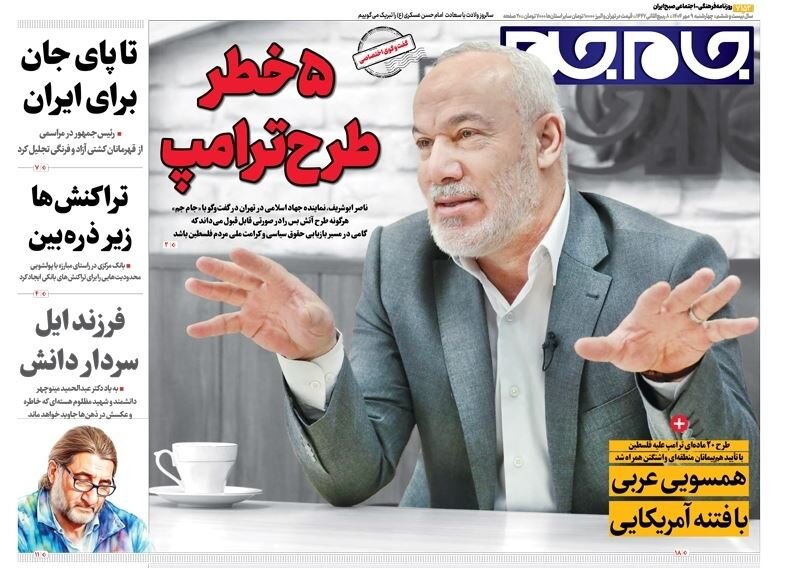It is essential to negotiate from a win-win standpoint

TEHRAN - Jam-e-Jam discussed the hidden dynamics of the country's political structure in an interview with Mohammad Reza Bahonar, the secretary general of the Islamic Society of Engineers.
He said: China and the United States are still negotiating with each other despite serious competition, or Russia and the United States despite the war in Ukraine, and this confirms the approach that negotiating with the United States is possible by observing certain conditions. We can negotiate with any country with which we share common interests, even countries that are hostile. We should not forget that we have a large Iranian lobby in the United States, and if common interests are defined, even American companies are willing to evade American sanctions. In this context, a principled view will help us. Before the imposed 12-day war, we were negotiating, but we were attacked. The task of this type of negotiation is clear. A negotiation in which one side says that you should not have any rights and you should not even be able to defend yourself is no longer a negotiation, but pure surrender. We must reach a point where we can negotiate in a win-win position by strengthening the country's deterrence and economic foundations, along with consolidating internal unity and cohesion. The negotiating field must guarantee our national interests.
Vatan-e-Emrooz: Snapback and move towards new multipolar world order
Vatan-e-Emrooz wrote: At first glance European trio's action in invoking the snapback sanctions that restored the anti-Iran UN Security Council resolutions seemed to be a political and security challenge between Iran, Europe, and the United States. But Russia and China strongly opposed the veto-proof snapback mechanism. Questioning the snapback sanctions by the two world powers is highly significant. This is evidence that the Eastern powers are seriously challenging the existing world order and are accelerating their activities to establish a new order in the emerging multipolar world. In such a situation, Iran has great opportunities ahead. Iranian foreign policy decisionmakers must understand the new circumstances and define strategies so that we can increasingly receive the support of countries that are pushing for the establishment of a new world order.
Iran: Prospects of Iran-China cooperation after snapback
The Iran newspaper spoke with Hamed Vafaei, a senior researcher on China affairs, about the country's policy regarding the snapback mechanism. He said: From China's point of view, the legitimacy of snapback is still questionable and has not yet been accepted as a definitive measure within the framework of the Security Council and the international system. The relationship with China should not be limited to trade; this cooperation should expand to geopolitical, geoeconomic, and even geo-cultural domains. How the framework for Iran's cooperation with China is formed is a matter that depends on the decision and deliberation of the Islamic Republic. Iran has extensive capacities in cooperation with China, from energy and new technologies to civilizational areas and initiatives related to global governance. Therefore, a part of Beijing's foreign trade will always be allocated to Iran. But how much this share will be and what quality it will have depends on our strategic outlook and planning. The sooner we enter into common dialogue with China in operational and geopolitical areas, the greater the possibility of forming a sustainable and balanced cooperation.
Khorasan: Plan for intervention
In a note, Khorasan addressed Trump’s goal in saying that he thinks Iran could join Abraham Accords. (At a White House press conference in Washington beside Israeli Prime Minister Benjamin Netanyahu on Monday, Trump said, "Who knows, maybe even Iran can get in there… I think they're going to be open to it. I really believe that. But they could be a member.") Khorasan wrote: This scenario is exactly what the Zionist regime’s intelligence services have been pursuing for years, namely activating political and security faults within Iran. The main goal is not for Iran to join the Abraham Accords, but rather to create suspicion, mental conflict, and incite internal division. Making such an impossible statement is itself part of a targeted maneuver with previous sinister intentions. He knows very well that the Islamic Republic will never give in to agreements that strengthen Israel and weaken Iran’s national interests; therefore, it is logical to view this statement as a sign of an attempt to continue the sabotage project that has failed in previous stages, including during the 12-day War. This remark has a purpose beyond utterance, which is intended to create doubt, weaken cohesion, and provide intelligence and security grounds for future interventions. It must be carefully monitored and analyzed by the competent institutions.
Leave a Comment